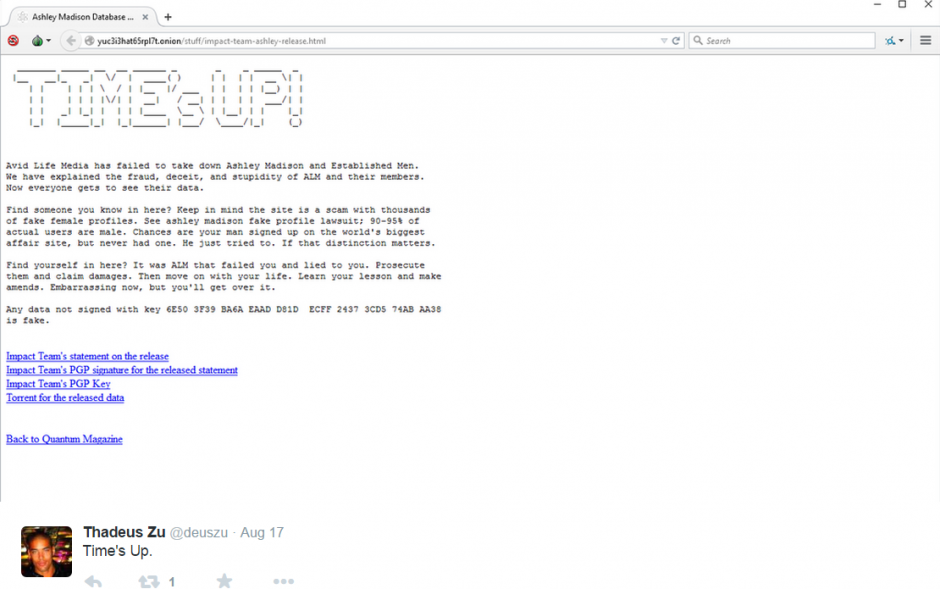Let’s face it, folks. The Ashley Madison hack wasn’t just another data breach—it was a scandal that shook the world. When the dust settled, millions of users were left exposed, and the internet had a new reason to talk about cybersecurity. But who hacked Ashley Madison? And why did it happen? That’s the million-dollar question we’re diving into today.
This wasn’t just a breach of data; it was a breach of trust. Ashley Madison, a website designed for people looking to have extramarital affairs, was hacked in 2015, exposing the personal information of over 37 million users. The fallout was massive, with lives ruined, marriages shattered, and reputations tarnished. But before we dive into the details, let’s set the stage.
Now, you might be wondering, why should you care about this? Well, it’s not just about the scandal—it’s about the lessons we can learn. This story is a wake-up call for anyone who thinks their online data is safe. So, buckle up, because we’re about to take a deep dive into the world of hackers, data breaches, and the consequences of living in a digital age.
Read also:Hugh Grant Wife A Comprehensive Look Into The Life And Marriage Of The Renowned Actor
What Happened to Ashley Madison?
Before we answer the question of who hacked Ashley Madison, let’s recap what happened. In July 2015, a group calling themselves “The Impact Team” announced that they had breached Ashley Madison’s servers. They claimed to have stolen sensitive user data, including names, email addresses, and credit card information. To add fuel to the fire, they threatened to release the data unless the site was shut down.
When the demands weren’t met, the group followed through on their threat. The leaked data included not only user information but also internal company documents, highlighting poor security practices and unethical behavior by the site’s operators. This breach wasn’t just about exposing cheaters—it was about exposing systemic issues in how companies handle user data.
Who Hacked Ashley Madison? The Mystery Unfolds
So, who hacked Ashley Madison? The group responsible for the breach called themselves The Impact Team. But here’s the kicker: no one knows who they really are. The Impact Team operated under a veil of anonymity, leaving behind no clear trail. They didn’t leave any digital fingerprints, and their motives were shrouded in mystery.
Some speculated that The Impact Team was a group of ethical hackers trying to expose Ashley Madison’s shady practices. Others believed it was a rival company looking to take down a competitor. And then there were those who thought it might have been an insider job. Whatever the truth, one thing is certain: The Impact Team knew exactly what they were doing.
Why Did They Do It?
The motives behind the Ashley Madison hack are as intriguing as the breach itself. Some believe The Impact Team acted out of moral outrage. After all, Ashley Madison’s business model was based on facilitating infidelity—a practice many find unethical. Others think it was purely about profit, with The Impact Team selling the stolen data on the dark web.
But here’s the twist: The Impact Team didn’t seem interested in making money. They didn’t ask for ransom, nor did they sell the data. Instead, they released it for free, claiming they wanted to expose the truth. Whether their intentions were noble or sinister, one thing is clear: they succeeded in making a statement.
Read also:Unveiling The Life And Legacy Of Linda Gray Gibb
Understanding the Impact of the Ashley Madison Hack
The Ashley Madison hack had far-reaching consequences. For starters, it exposed millions of users to public ridicule and embarrassment. Many people lost their jobs, marriages, and even their lives. The psychological toll was immense, with some users reportedly committing suicide after their identities were revealed.
But the impact wasn’t limited to individuals. The breach also exposed systemic issues in how companies handle user data. Ashley Madison’s security practices were found to be woefully inadequate, with weak encryption and poor data management. This breach served as a wake-up call for businesses everywhere, highlighting the importance of cybersecurity in the digital age.
What Can We Learn from This?
The Ashley Madison hack teaches us several valuable lessons. First, it shows us the importance of data security. Companies must take every possible measure to protect user data, whether it’s encrypting sensitive information or implementing robust security protocols. Second, it highlights the ethical responsibilities of businesses. Companies should prioritize the well-being of their users over profit.
Finally, it serves as a reminder of the power of anonymity. In a world where digital footprints are everywhere, it’s crucial to be mindful of the information we share online. The Ashley Madison hack wasn’t just about exposing cheaters—it was about exposing the vulnerabilities of our digital lives.
The Role of Cybersecurity in Preventing Breaches
Cybersecurity plays a critical role in preventing data breaches like the one that hit Ashley Madison. In today’s digital landscape, companies must invest in cutting-edge technology to protect user data. This includes implementing strong encryption, regular security audits, and employee training programs.
But it’s not just about technology. Companies must also foster a culture of security awareness. Employees should be trained to recognize phishing attempts and other cyber threats. By creating a security-conscious environment, businesses can reduce the risk of breaches and protect their users from harm.
How Can Individuals Protect Themselves?
While companies bear the responsibility of protecting user data, individuals can also take steps to safeguard their information. Here are a few tips:
- Use strong, unique passwords for each account.
- Enable two-factor authentication whenever possible.
- Avoid sharing sensitive information online.
- Stay informed about the latest cybersecurity threats.
By following these simple steps, individuals can reduce the risk of becoming victims of data breaches. It’s all about being proactive and staying one step ahead of potential threats.
The Psychological Impact of the Ashley Madison Hack
The psychological impact of the Ashley Madison hack cannot be overstated. For many users, the breach was a life-altering event. They faced public humiliation, social ostracism, and even violence. Some users reported feeling anxious, depressed, and suicidal after their identities were exposed.
But the psychological impact wasn’t limited to users. It also affected their families, friends, and communities. The breach shattered trust and exposed deep-seated insecurities. It’s a stark reminder of the power of the internet and the importance of digital privacy.
How Can We Support Those Affected?
Supporting those affected by the Ashley Madison hack requires empathy and understanding. Here are a few ways to help:
- Encourage open communication and dialogue.
- Offer emotional support and resources.
- Respect privacy and confidentiality.
- Advocate for stronger data protection laws.
By standing together, we can create a safer and more compassionate digital world. It’s all about building a community that values privacy and respects individual rights.
The Ethical Implications of the Ashley Madison Hack
The Ashley Madison hack raises important ethical questions. Is it ever okay to expose someone’s private information? Should companies be held accountable for facilitating unethical behavior? These are complex issues with no easy answers.
On one hand, The Impact Team exposed a company that profited from people’s infidelity. On the other hand, they violated the privacy of millions of users. The ethical implications of the hack highlight the need for a balanced approach to data protection and corporate responsibility.
Where Do We Draw the Line?
Drawing the line between privacy and accountability is no easy task. It requires a nuanced understanding of the issues at play. Companies must prioritize user privacy while also being transparent about their practices. At the same time, individuals must take responsibility for their actions and the information they share online.
Ultimately, it’s about finding a balance that respects both individual rights and societal norms. By working together, we can create a digital world that values privacy, accountability, and ethical behavior.
The Future of Cybersecurity
The Ashley Madison hack was a wake-up call for the cybersecurity industry. It highlighted the vulnerabilities of our digital systems and the need for stronger protections. As technology continues to evolve, so too must our approach to cybersecurity.
In the future, we can expect to see advancements in encryption, artificial intelligence, and blockchain technology. These innovations will help companies better protect user data and prevent breaches like the one that hit Ashley Madison. But technology alone isn’t enough. It’s also about fostering a culture of security awareness and ethical responsibility.
What’s Next for the Digital World?
The digital world is evolving at breakneck speed, and with it comes new challenges and opportunities. As we move forward, it’s crucial to prioritize cybersecurity and digital privacy. This means investing in cutting-edge technology, fostering a culture of security awareness, and advocating for stronger data protection laws.
By working together, we can create a safer and more secure digital world. It’s all about being proactive, staying informed, and taking responsibility for our digital lives. The Ashley Madison hack may have been a dark chapter in internet history, but it also serves as a powerful reminder of the importance of cybersecurity.
Conclusion: What Have We Learned?
The Ashley Madison hack was a wake-up call for the digital world. It exposed the vulnerabilities of our systems, the importance of cybersecurity, and the ethical responsibilities of businesses. By understanding the lessons of the past, we can create a safer and more secure digital future.
So, what can you do? Start by taking steps to protect your own data. Use strong passwords, enable two-factor authentication, and stay informed about the latest cybersecurity threats. And don’t forget to advocate for stronger data protection laws and ethical corporate practices.
Finally, don’t hesitate to share your thoughts in the comments below. Let’s keep the conversation going and work together to build a better digital world. After all, the future of cybersecurity depends on all of us.
Table of Contents
- What Happened to Ashley Madison?
- Who Hacked Ashley Madison? The Mystery Unfolds
- Why Did They Do It?
- Understanding the Impact of the Ashley Madison Hack
- What Can We Learn from This?
- The Role of Cybersecurity in Preventing Breaches
- How Can Individuals Protect Themselves?
- The Psychological Impact of the Ashley Madison Hack
- How Can We Support Those Affected?
- The Ethical Implications of the Ashley Madison Hack
- Where Do We Draw the Line?
- The Future of Cybersecurity
- What’s Next for the Digital World?
- Conclusion: What Have We Learned?


